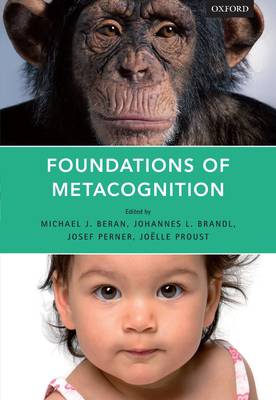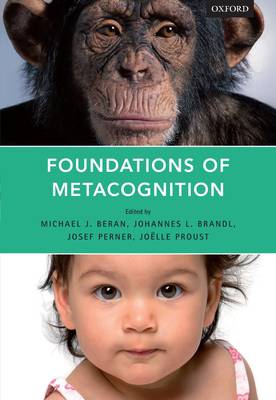
Vous voulez être sûr que vos cadeaux seront sous le sapin de Noël à temps? Nos magasins vous accueillent à bras ouverts. La plupart de nos magasins sont ouverts également les dimanches, vous pouvez vérifier les heures d'ouvertures sur notre site.
- Retrait gratuit dans votre magasin Club
- 7.000.000 titres dans notre catalogue
- Payer en toute sécurité
- Toujours un magasin près de chez vous
Vous voulez être sûr que vos cadeaux seront sous le sapin de Noël à temps? Nos magasins vous accueillent à bras ouverts. La plupart de nos magasins sont ouverts également les dimanches, vous pouvez vérifier les heures d'ouvertures sur notre site.
- Retrait gratuit dans votre magasin Club
- 7.000.0000 titres dans notre catalogue
- Payer en toute sécurité
- Toujours un magasin près de chez vous
Foundations of Metacognition
Michael J Beran, Johannes Brandl, Josef Perner, Joelle Proust
Livre relié | Anglais
168,45 €
+ 336 points
Description
Metacognition refers to the awareness an individual has of their own mental processes (also referred to as ' thinking about thinking'). In the past thirty years metacognition research has become a rapidly growing field of interdisciplinary research within the cognitive sciences. Just recently, there have been major changes in this field, stimulated by the controversial issues of metacognition in nonhuman animals and in early infancy. Consequently the question what defines a metacognitive process has become a matter of debate: how should one distinguish between simple minds that are not yet capable of any metacognitive processing, and minds with a more advanced architecture that exhibit such a capacity? Do nonhuman animals process the ability to monitor their own mental actions? If metacognition is unique to humans, then at what stage in development does it occur, and how can we distinguish between cognitive and metacognitive processes? The Foundations of Metacognition brings together leading cognitive scientists to consider these questions. It explores them from three different perspectives: from an evolutionary point of view the authors ask whether there is sufficient evidence that some non-human primates or other animals monitor their mental states and thereby exhibit a form of metacognition. From a developmental perspective the authors ask when children start to monitor, evaluate und control their own minds. And from a philosophical point of view the main issue is how to draw the line between cognitive and metacognitive processes, and how to integrate the different functions in which metacognition is involved into a single coherent picture of the mind. The foundations of metacognition - whatever they will turn out to be - have to be as complex as this pattern of connections we discover in its effects. Bringing together researchers from across the cognitive sciences, the book is valuable for philosophers of mind, developmental and comparative psychologists, and neuroscientists.
Spécifications
Parties prenantes
- Auteur(s) :
- Editeur:
Contenu
- Nombre de pages :
- 368
- Langue:
- Anglais
Caractéristiques
- EAN:
- 9780199646739
- Date de parution :
- 25-10-12
- Format:
- Livre relié
- Format numérique:
- Genaaid
- Dimensions :
- 249 mm x 178 mm
- Poids :
- 805 g







